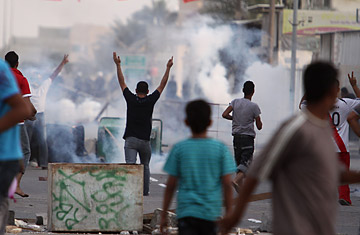
Antigovernment protesters face riot police firing tear gas on March 23, 2011, in the Shi'ite village of Malkiya, Bahrain
Liz, a Shi'ite in her late 20s, is afraid to leave her house. She says that the last time she went out, government-hired thugs stopped her car at one of the many checkpoints that litter Manama, the capital of Bahrain. They pulled her out, asked for her identity card and tried to ascertain one thing: whether she was Sunni or Shi'ite.
"It's pure racial profiling," she says a few days later, sitting in her family's living room in Al'Ali, a Shi'ite village north of Manama. "Your name could lead to your arrest if it's a Shia name." Her brother, an IT engineer, asks not to be named for fear of retribution. The last time he went out, thugs pulled him over, with his wife and child in the car. "They hauled me out, asked, 'Are you Sunni or Shia?'" he says. "My dearest friend since childhood is a Sunni. Now he won't even speak to me. He's a former roommate, and now he treats me like a stranger." Anytime he speaks to Sunnis now, he says, "it's like there's an invisible shield between us."
An increasingly bitter sectarian divide is eroding the social fabric of the island kingdom, the result of a crackdown by the ruling Sunni government on Shi'ite antigovernment protesters. The government's new, highly effective strategy of divide and rule has sought to split the country along sectarian lines, making it harder for protesters to organize a credible national opposition movement. "The most successful revolutions in the region have been in Egypt and Tunisia, and that's because protesters have been able to unite people from different backgrounds," says Jane Kinninmont, senior research fellow for the Middle East and North Africa Program at Chatham House. "Division in conflict is a powerful tool."
So far, at least 25 Shi'ites have been killed, hundreds injured and hundreds more activists, high-profile bloggers and political leaders arrested by Bahraini government forces in violent predawn raids. Opposition-party headquarters have been torched, Shi'ite citizens shot at random by security forces. The crisis has polarized the two sects — Sunnis, the wealthier ruling class, vs. Shi'ites, who comprise the 70% majority. In February, demonstrators from both groups had said they were united. "No Sunni, no Shia," they chanted. They waved banners that read, "We are one." That unity has dissipated.
"The Bahraini regime has increasingly adopted an us-vs.-them attitude, seeing Shias as intent on subverting the country," says Shadi Hamid, research director at the Brookings Doha Center and a fellow at the Saban Center for Middle East Policy. "By repeating the same narrative over and over, more Sunnis start believing it, and more Shias feel they are being painted as enemies." The biggest factor in the split is propaganda spread by state-controlled media, namely flagship network Bahrain TV. The regime also continues to jail opposition journalists and independent bloggers, has placed strict visa restrictions on foreign reporters and shuttered the newspaper of opposition party al-Wefaq.
According to the opposition, Bahrain TV's tactics include the false planting of guns and knives at protesters' feet. Medical staffers at Salmaniya Hospital, which was for a time under military control, told TIME that station crews had allowed a doctor to leave, filmed his happy exit, then beat and sent him back inside the emergency room. "Bahrain TV is playing with fire by taking the lead of creating sectarian conflict between the two denominations," says one opposition leader, asking to remain anonymous. On March 22, in the first demonstration on the streets of Manama since martial law was declared the week before, protesters added a new chant to their usual repertoire calling for the toppling of the Bahraini King, "Down with Bahrain TV."
Across the island a few days before the rally, in the Sunni community of Galali, the streets were peaceful and devoid of police, in contrast to the gun-toting checkpoints around Shi'ite communities. Najah, a Sunni, was driving in her new red sport-utility vehicle. She spoke of the protesters with vitriol, saying she had heard on Bahrain TV that they were attacking riot police with guns and knives. "Before we lived, ate and worked together," she said of Sunnis and Shi'ites. "We want to live in peace. Everyone's asking why the Shi'ites are doing this to our country. We're scared." She was parked in front of a community center whose garden, bystanders said, was normally filled in evenings by Sunnis and Shi'ites, who gather to talk and smoke shisha. It's been empty for weeks.
Hasan Ali Ashifi, a retired airport engineer, spoke in front of a leafy villa in Amwaj Islands, a wealthy area largely populated by Sunnis and expatriates and physically a world away from the beleaguered Shi'ite villages across the causeway. He said he and other Sunnis had stopped supporting the protests when they went beyond the original demands of democratic reform and started calling for the King's ouster. "We supported the original protests when they wanted housing and education," he said. "Sunnis want that too. But we don't want to take out the whole government. And we don't want them using violence."
